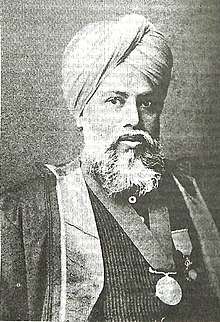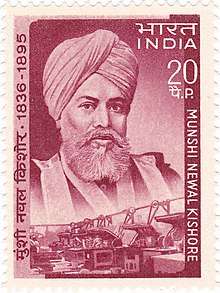Munshi Nawal Kishore
Munshi Nawal Kishore (3 January 1836 – 19 February 1895) was a book publisher from India. He has been called Caxton of India. In 1858, at the age of 22, he founded the Nawal Kishore Press at Lucknow. This institution today is the oldest printing and publishing concern in Asia.[1] Mirza Ghalib was one of his admirers.
Munshi Nawal Kishore | |
|---|---|
 | |
| Born | 3 January 1836 |
| Died | 19 February 1895 (aged 59) |
| Nationality | British Indian |
| Occupation | Book publisher, magazine editor |
| Known for | Nawal Kishore Press |
Biography

Munshi Nawal Kishore was the second son of Munshi Jamuna Prasad Bhargava, a zamindar of Aligarh, and was born on 3 January 1836. At the age of six, he was admitted in a local school (maktab) to learn Arabic and Persian. At the age on 10, he was admitted in Agra College, but he never completed his education there for an unknown reason. During this time, he developed his interest in journalistic writing, and issued a short-lived weekly paper Safeer-e-Agra. He briefly served as an assistant editor and editor of Koh-i-Noor, a magazine of Koh-i-Noor Press owned by Munshi Harsukh Roy.[2]
On 23 November 1858, he founded a printing press known as Munshi Nawal Kishor Press. From 1859, he started publishing weekly newspaper Avadh Akhbar, also known as Oudh Akhbar.[2]
He died on 19 February 1885[3] in Delhi. His body was buried[4] instead of traditional cremation. The Government of India issued a postage stamp on him in his honour in 1970.[5]
Munshi Nawal Kishore published more than 5000 books in Arabic, Bengali, Hindi, English, Marathi, Punjabi, Pashto, Persian, Sanskrit and Urdu during 1858–1885.[6] The Ram Kumar Press and Tej Kumar Press, started by his sons, are successors to the Nawal Kishore Press.
Munshi was a member of the Indian National Congress.[7]
References
- Empire of Books, An: The Naval Kishore Press and the Diffusion of the Printed Word in Colonial India, Ulrike Stark, Orient Blackswan, 1 June 2009
- Haider, Syed Jalaluddin (January 1981). "Munshi Nawal Kishore (1836—1895) : Mirror of Urdu Printing in British India". Libri. 31 (1): 227–237. doi:10.1515/libr.1981.31.1.227.

- C. E. Buckland (1999). Dictionary of Indian Biography. 2. COSMO Publications. pp. 314–315. ISBN 978-81-7020-897-6.
- Burial of Munshi Newal Kishore
- "Munshi Newal Kishore". iStampGallery.Com. 26 January 2015. Retrieved 8 July 2019.
- "Rediscovering Munshi Newal Kishore, Committee on South Asian Libraries and Documentation SALNAQ: South Asia Library Notes & Queries, Issue_29, 29_1993_14" (PDF). Archived from the original (PDF) on 30 January 2015. Retrieved 29 January 2015.
- "LITHOGRAPHY ii. IN INDIA – Encyclopaedia Iranica". Encyclopædia Iranica. 15 August 2009. Retrieved 22 April 2020.
Further reading
- Stark, Ulrike (2004). "Hindi Publishing in the Heart of an Indo-Persian Cultural Metropolis : Lucknow's Newal Kishore Press (1858–1895)". In Blackburn, Stuart H.; Dalmia, Vasudha (eds.). India's Literary History: Essays on the Nineteenth Century. Orient Blackswan. ISBN 978-8-17824-056-5.
- Nurani, Amir Hasan (1995). Savāniḥ Munshī Navalkishor سوانح منشى نول كشور [On the life of Munshi Navalkishor] (in Urdu). Patna: Khuda Baksh Oriental Public Library. OCLC 658143281.